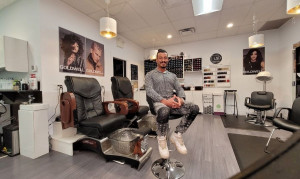Housed in a three-storey storefront facing the bustling King West neighbourhood, 6City offers a cafe on the main floor, a barbershop on the second, and a rooftop deck overlooking an ample outdoor event space in the back. As far as I know, this is the most prominent Black-owned hybrid cafe/barbershop in the city, which also happens to be a breeding ground for creativity, entrepreneurship and community building. If for no other reason, it feels deserving of investigation and a story worthy of excavation.
“In The Bahamas, there’s a strong sense of community, fellowship and sharing,” began Johnson, working diligently behind the bar where he moonlights as both barista and bartender. His hands are a brass blur, working “Black” magic over an espresso machine spewing foam and caffeine. In the Bahamas, his uncle’s father (through marriage to his mother’s sister) started one of the oldest barbershops in New Providence, Nassau. “Johnson’s Barbershop” was known for having an old-school barbershop vibe.
“There were guys in there conversing and cracking jokes with the sense that you could say anything without judgement. So if the older heads gave you advice, you had to be vulnerable enough to take it,” Johnson said, sliding a divine cup of coffee in my direction. “I’ve always kept this in mind while building my barbershop. I’ve always intended for it to be a safe space where a community of people could express themselves free of judgment.
Nate went to university in Halifax, New Brunswick, where he earned a degree in computer sciences. He began barbering on the side to make some money and have fun.
“The school told international students to bring their own barber kits because there weren’t a lot of places for Black people especially to get their hair done,” Johnson recalled. “They told you that from the onset and also advised us to bring along things like first aid kits, sewing kits, etcetera because you have to stay on campus.”
Johnson was ready on the hair kit front and brought a barber kit with the intention of cutting hair on campus. After experimenting with his hair, he eventually felt comfortable enough to cut other people's hair.
I started working at an Italian-owned, on-campus barbershop that had never hired a Black barber before,” Johnson said. “The shop owner became ill, and his daughter needed someone to help out. That’s one thing about the barbering industry; the barber can’t get sick and can’t just go on vacation.”
Nate worked there until graduating with a degree in computer sciences and left Halifax for Toronto to find a career in software. When that job didn’t immediately materialize for him, Johnson thought to supplement his income by barbering. Two haircuts and a nod of approval later, he was offered a chair and hired on the spot at a barbershop downtown. After five years of cutting all sorts of hair in Halifax, straight, curly and kinky, he was ready for his own chair. Even after eventually finding work at RBC in solution architecture, he continued working double duty at the barbershop after bankers’ hours and weekends.
“As a 24-year-old Black man in the financial district, I developed a relationship with a lot of non-Black people in higher places. Maybe they respected me because I was easy to understand and have good emotional intelligence,” said Johnson before exposing the benefits of code-switching in the workplace.
“There may have been another Black co-worker who they couldn’t understand as well, and some of these non-Black folks would ask me, ‘why can’t I understand them like I can you?’ and I’d say, I don’t know, maybe you should try harder.” His observation wasn’t without understanding the racial and cultural power dynamics at play.
“The Bahamas was colonized by the British, so we had English diction classes from day one,” Johnson explained. “However, as soon as you left school, you went right back into your dialect because there’s an inherent desire to gravitate toward things that are more natural.”
Even though he felt respected in his role and paid well to do it, this natural impulse to seek out the familiar led him to feel less comfortable in that environment. He began to question his life’s trajectory.
“I saw someone fifty years old making ten or fifteen thousand dollars more than me, spending two hours going to and from work, shower, maybe seeing his kids for 20 minutes, then mentally preparing himself to do the same thing tomorrow. If he stops to look at his life in five years, he’ll realize he’s walked the same steps for 25 years,” Johnson remarked. “I knew I didn’t want that.”
Still, his responsibilities in the corporate world demanded more of his time. Johnson was flying into the states doing projects for companies like BMO-Harris, RBC, Cannetix, etcetera, but the structure of 9 to 5 in software, the requirement to think within a box, was not for him.
“I left RBC in 2017 and used my bonuses to launch the first 6City Barbershop on Spadina (Chinatown) in 2017, starting with buying chairs a full year before I even had a space,” Johnson said, demonstrating the sort of risks taken to launch his business. Although he was still acting as a consultant with Capco, he set up his own software that allowed people to book haircuts only when he would be at the shop.
“It was and still is a very lean operation, but I left Capco in 2018 and transitioned into cutting hair full time,” Johnson stated, the pride of that moment still evident in his smile.
It was the last corporate gig he would have.
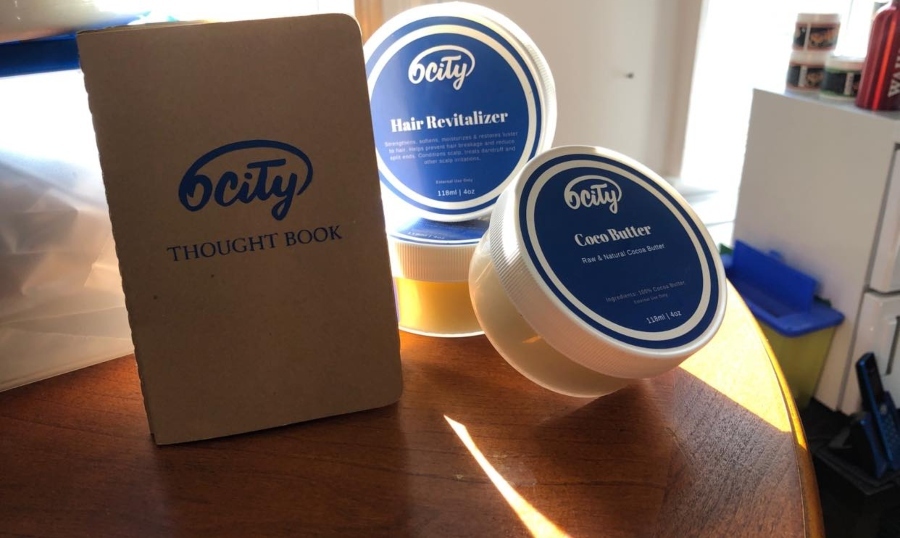
6city branded products Credit: Byron Armstrong
Then, in 2020, the pandemic closed his business for two months. As any business owner affected by the pandemic will tell you, the government initially made the landlords responsible for requesting rent relief. The problem was the parameters for making that money up were unclear, so many landlords just didn’t bother. Johnson’s landlord was one of the latter. Before this, Nate was a model tenant paying his rent a month in advance. There was a series of contentious, accusatory phone conversations between Johnson and the landlord’s daughter. Then one night, around 2 am, an alarm went off at his shop. He was alerted to what he believed was a robbery in progress from his apartment. He jumped in his vehicle and drove to the shop.
“Fifteen days into the month, during a pandemic, I found an eviction notice on my door,” Johnson said, bristling. “The landlord changed the locks. The landlord’s daughter told me I needed to speak to the bailiff to gain access to my shop, and they were ready to seize my assets.”
He called his lawyer, who immediately called out racist undertones (his landlords were White) in his treatment. Keep in mind; this was at a time when the refrain “Black Lives Matter” was on everyone’s lips. All that said, Nate just wanted his assets. His lease would’ve been up in three months anyway, and he had already sourced his next space, a three-story building on King West he wasn’t sure he could afford but was motivated to negotiate. 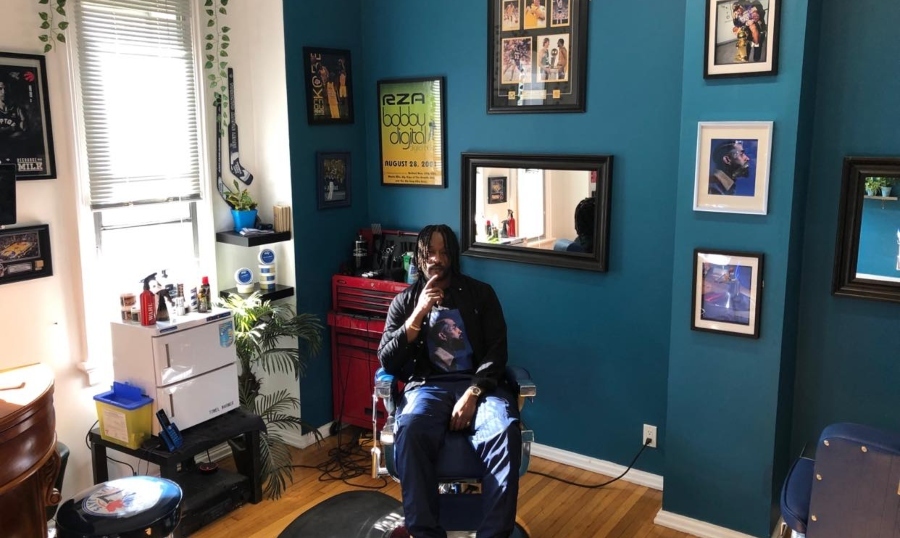
Nate in the barber's chair at 6City Credit: Byron Armstrong
“You want one person with money and a sustainable business that makes sense. The last place was a cannabis dispensary, which tells me you’ve been taking blind risks with your investment. What I’m offering is comfortable for you. It’s unfeasible for you to rent out each of these floors to separate businesses,” said Johnson of the factors he pointed out in his negotiation with the new landlords.
Considering his background in the financial district, I don’t think it’s unfair to assume that his time there prepared him well for this moment. He knew how to corporate-speak with his corporate landlords. After a three-month negotiation, he earned his new space. Still, it was a process.
“I got the sense they didn’t want to rent the space to me initially,” Johnson said. “They wanted four months’ rent upfront and ten million dollars worth of insurance. When you’re Black, they will play on the fact you may be unaware of certain things or treat you like it’s an opportunity you’ve never had before so they can have their way, but I try to refute all of that.”
His litigious ex-landlords gave Johnson two hours with the bailiff to get his equipment out, much of which ended up in his apartment until the new space was ready.
“I didn’t sleep for months,” Johnson added. “I had to tear down the walls and reno this place with no money, or if I got some money, with small teams of people. Once, this building was an illegal dispensary built like Fort Knox and raided by the police. I paid a thousand dollars to the city to put up a sign. I had to figure out how to use all the space, I wasn’t allowed to sublease, and I still had to make it welcoming.”
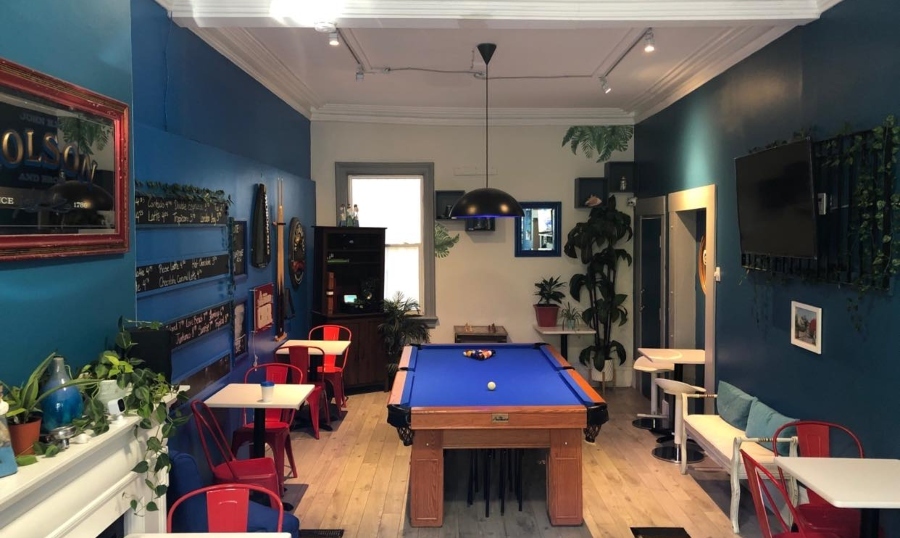
The bar and cafe view at 6city Credit: Byron Armstrong
This is where Johnson’s Bahamian culture came into play. He began working on the community spirit he remembered from his early days in an uncle’s barbershop, building out more than another hybrid cafe/barbershop.
“Community events like poetry nights, Jerk BBQs, the tropical drinks bar, and the Bahamian influenced cafe interior, are elements of me saying, I don’t want to lose my culture. I want to share it,” Johnson said. “6City is a Toronto-related name, but I infuse the Caribbean into it because I want to make it culturally relevant. I’ve always thought that Toronto is a cultural hub, but no glue brings all these different, siloed-off cultures together.”
Johnson hopes to be a mediator who provides some common ground where everyone can come together and feel free to express themselves in a safe space.
“I want people with great attitudes and an appreciation of culture who just want to be themselves, but it’s not meant to be bougie or anything like that,” explained Johnson. “Poetry was a great way to bring people together with something that’s not heavy or inaccessible, that gets them out of their homes and opens up a space for vulnerability. One night, a guy with an African speaking drum played, and the room went quiet. I realized that we had something then, and people want to share their feelings so badly.”
{https://youtu.be/GJdrX1Wlad8}
Aside from Johnson, he credits his employee Tia (who is also Bahamian) for helping to brainstorm a lot of their events. Sometimes though, the lack of an event can be an opportunity for self-care in itself. As such, there will be days where people will just be able to come in and unwind, either with a freshly brewed cup of java or a rum-splashed concoction. In future, Johnson plans to have lounge night, where each floor may play something different.
“R&B, afrobeat, or whatever, with like 60 people spread out between the floors so you can still meet different people in a controlled space,” said Johnson. He believes the pandemic has exposed how crucial human connection is.
“Me, being an immigrant away from my family with no time for relationships, I’ve figured out how to turn my personal challenges into solutions.”
Johnson made the point as he spun out his next idea in front of me. “I haven’t been able to be in a relationship because of this business, so something I want to start is a speed dating night. I know people wish to have these things because I know these are things I would want.
Running a business successfully, especially one based in community, requires just that. Knowing what people want beyond a superficial level and then taking up the responsibility of creating that space for them. If Nate Johnson has his way, 6City will become that place.
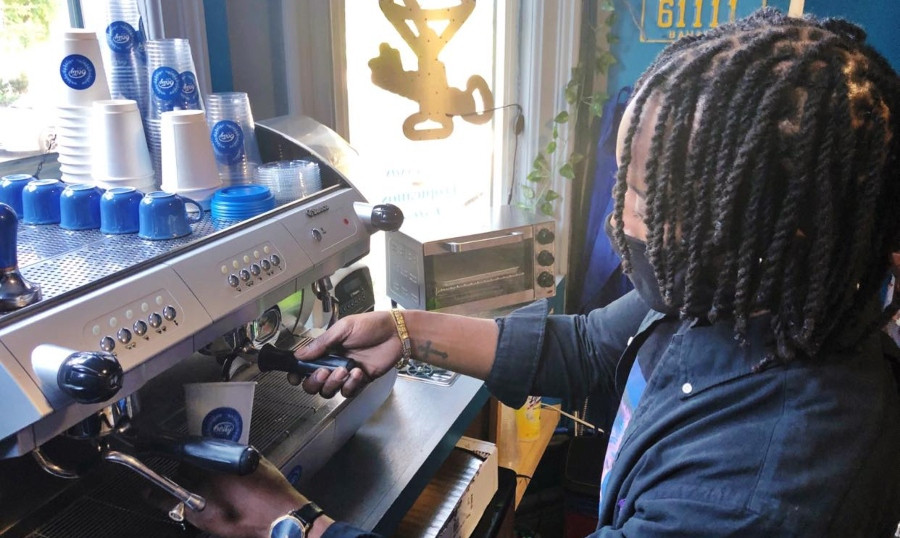
 By
By 




